How to Improve Your SEO Ranking in 2024 (With Proven Examples)
Picture this: you’ve just launched a brand new website for your business.
You’re excited and ready to showcase your products or services to the world.
But there’s one problem – you need help finding your website. It’s like you’re shouting into an empty room. This is where SEO ranking comes into play.
SEO ranking determines the visibility and position of your website in search engine results.
It’s not just about being on the first page; it’s about securing that top spot. Why does it matter?
Because higher rankings mean more organic traffic, more potential customers, and ultimately, more revenue for your business.
Understanding SEO ranking is crucial for online success. So buckle up and get ready to boost your website’s visibility in search engine results.

Understanding SEO Rankings
SEO ranking refers to a website’s position in search engine results pages (SERPs).
It is crucial for businesses and website owners because higher rankings can drive more organic traffic and improve brand visibility.
When a website appears on the first page of search results, it has a higher chance of being clicked on by users.
A good understanding of SEO practices is essential as it can significantly impact the success of a website.
Websites can improve their rankings on search engines like Google by optimising various aspects such as keywords, content quality, site structure, and user experience.
This means that when someone searches for a specific keyword related to their business or industry, their website has a better chance of appearing at the top of the results.
But how?
Here’s a screenshot from one of our clients.
As you can see in the chart below, we managed to increase our client’s average keyword ranking by 84.28% within 2 months!
And due to implementing the correct strategies, this site ranks for 50+ medium to high competitive commercial keywords (high buying intent keywords) with an average of 700 monthly search volume.
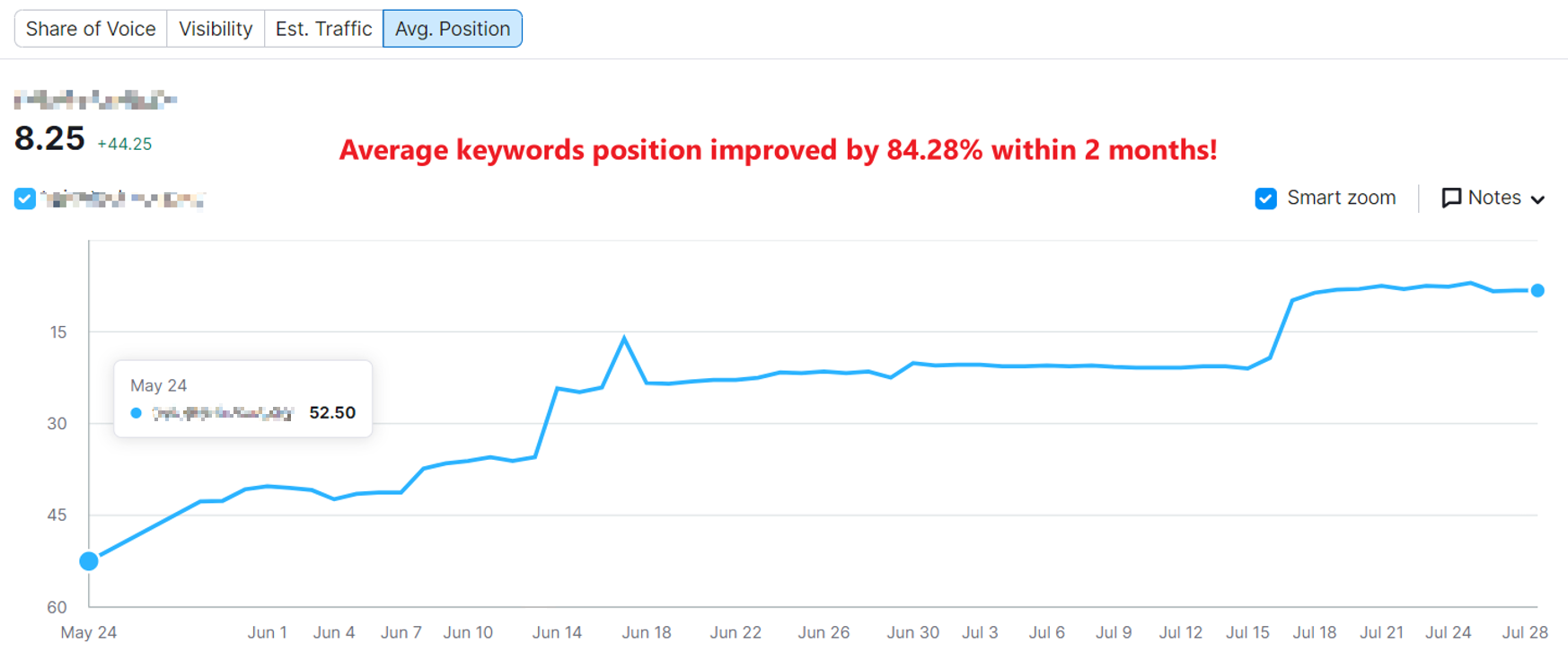
Want to know how we did it? Read more in our article 9 Epic Link-Building Case Studies You Can’t Afford to Miss
Wait! Are you suggesting black hat strategies?
Nope!
In fact, not all results that are showing keyword ranking improvement within short period means they’re using black hat strategies.
Before the Google Penguin algorithm updates, numerous websites used black hat SEO techniques to achieve high rankings.
Tactics such as keyword stuffing, spamming 1000 backlinks daily, and generating spun AI content were prevalent. These methods, however, are now penalised by search engines (especially the recent Google Core Updates!)
However, these tactics can result in penalties from search engines and damage a website’s reputation in the long run.
On the other hand, long-term, white-hat strategies focus on building a solid foundation for sustainable SEO success.
This includes creating high-quality content, optimising technical aspects of the website, building backlinks naturally, and engaging with the target audience through social media and other channels.
It’s about building a brand.
While it may take time to see significant improvements in rankings with long-term strategies, they are more effective and provide lasting results.
Google’s Top Ranking Factors You Should Know (At Least)
To achieve a high SEO ranking on Google, it is essential to understand the factors that influence search engine rankings.
Google considers hundreds of ranking factors when determining a website’s position on its SERPs.
Let’s explore some key factors that can impact your website’s SEO ranking.
Relevance: Matching User Intent
Relevance is one of the key factors that influence SEO ranking.
Search engines aim to provide users with the most relevant results based on their search queries.
To achieve a high SEO ranking, creating content that aligns with user intent is essential.
This means understanding what users search for and crafting content that addresses their needs and queries.
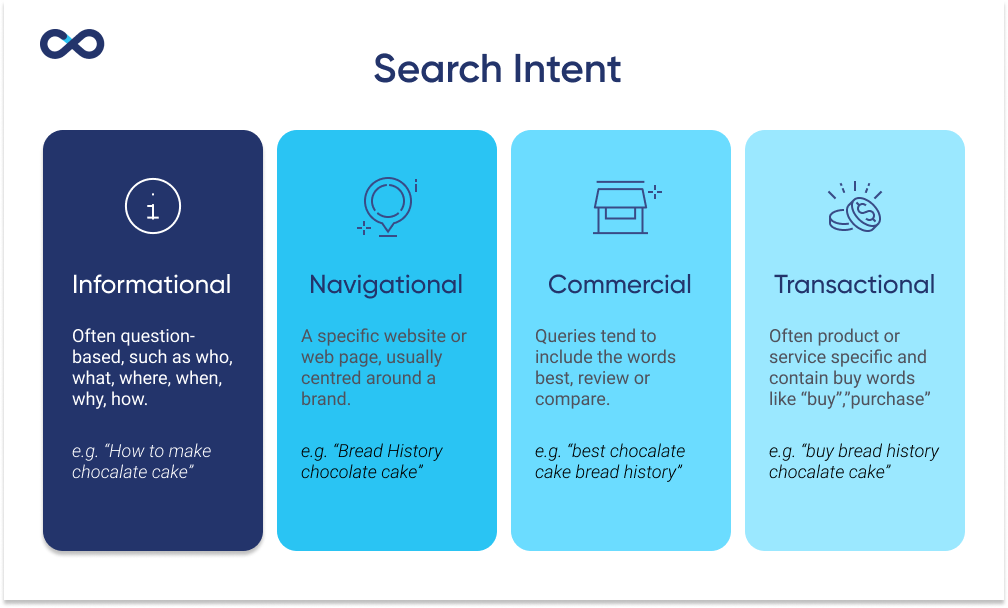
So, how do you know the search intent?
It’s simple – see what comes out in the search results.
For example, if someone searches for “best-running shoes,” search engines will prioritise websites or webpages that provide comprehensive information about running shoes, including reviews, buying guides, and recommendations.
Creating content matching user intent can increase your chances of ranking higher in search results.
Authority: Building Trust and Credibility
Another critical factor in SEO ranking is authority. Search engines consider the credibility and trustworthiness of a website when determining its ranking.
Websites with high authority are more likely to rank higher than those with low authority.
So, how do you build authority?
Firstly, build your topical authority through pillar topics and topic clusters. Pillar topics involve creating content around a central, broad subject, known as the pillar topic, such as “digital marketing.”
This topic is central to your business or industry and covers a core theme for which you want to be recognised.
On the other hand, topic clusters are subtopics related to the pillar topic, such as “SEO strategies” or “social media marketing trends.”
Each subtopic delves into specific aspects of the pillar topic, linking to the main pillar page and creating a cluster of related content.
How do you create your pillar topics and topic clusters?
Here’s a guide on the steps:
- Determine 4-5 pillar topics related to your niche
- Determine 10-20 topic clusters that are related to each pillar topic
- Create a topical map
- Write your content and internal link them
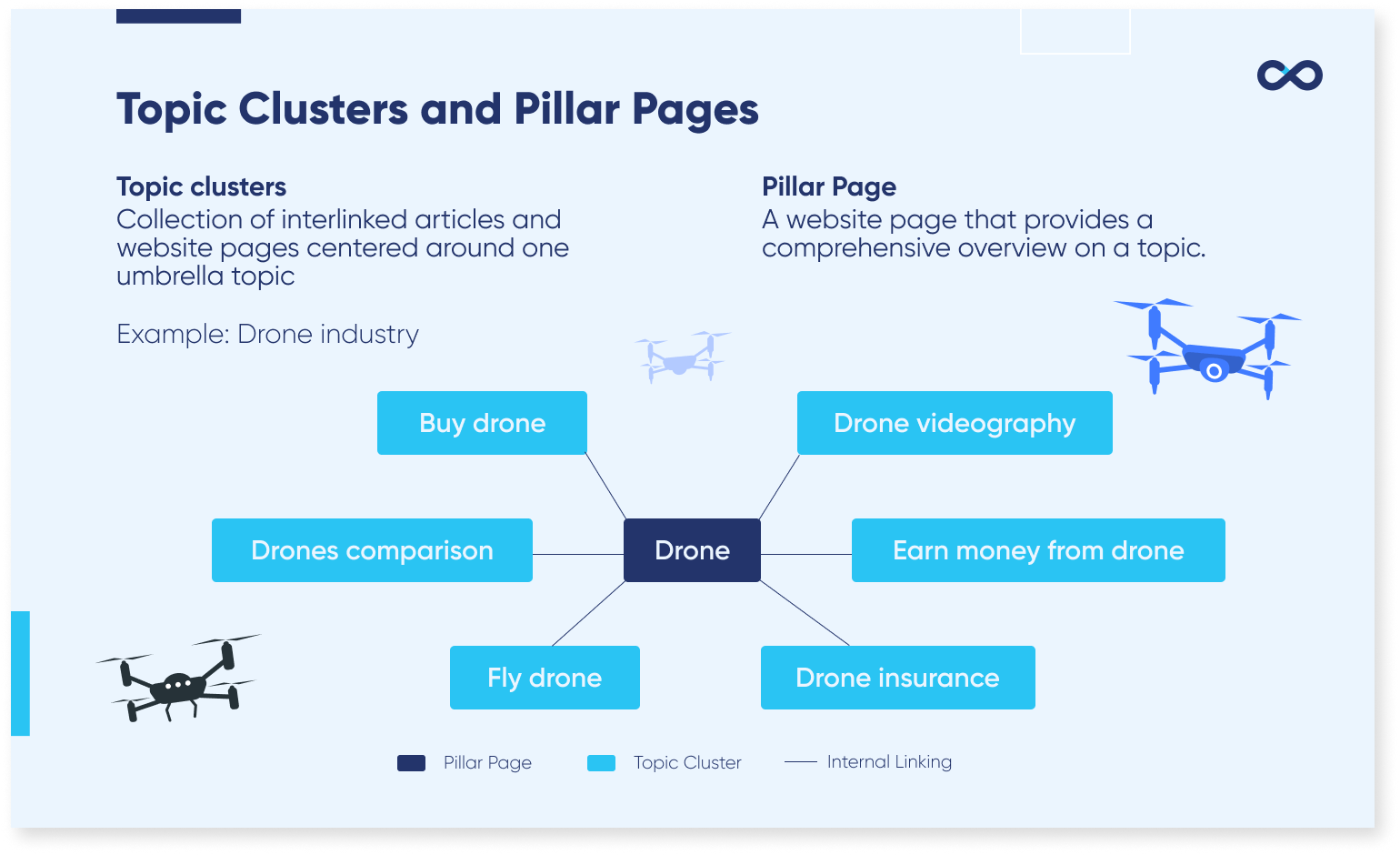
Secondly, you must acquire backlinks from reputable websites (more about this later).
Once your site gains favour in Google’s algorithm, your new pages and posts can rank quickly.
On-Page Optimisation: Optimising Website Elements
On-page optimisation plays a vital role in improving SEO rankings.
It involves optimising various elements within a webpage to make it more appealing to users and search engines. Some essential on-page optimisation techniques include:
Keyword optimisation: Incorporating relevant keywords naturally within the content, title tags, meta descriptions, and headers.
Content quality: Creating high-quality, informative, and engaging content that satisfies user intent.
Mobile-friendliness: Optimizing websites for mobile devices to cater to increasing mobile users.
User experience (UX): Designing websites that are easy to navigate, visually appealing, and provide a seamless browsing experience.
By implementing these on-page optimisation techniques, you can improve your website’s visibility and increase its chances of ranking higher in search results.
Check out our article about SEO strategies to learn more!
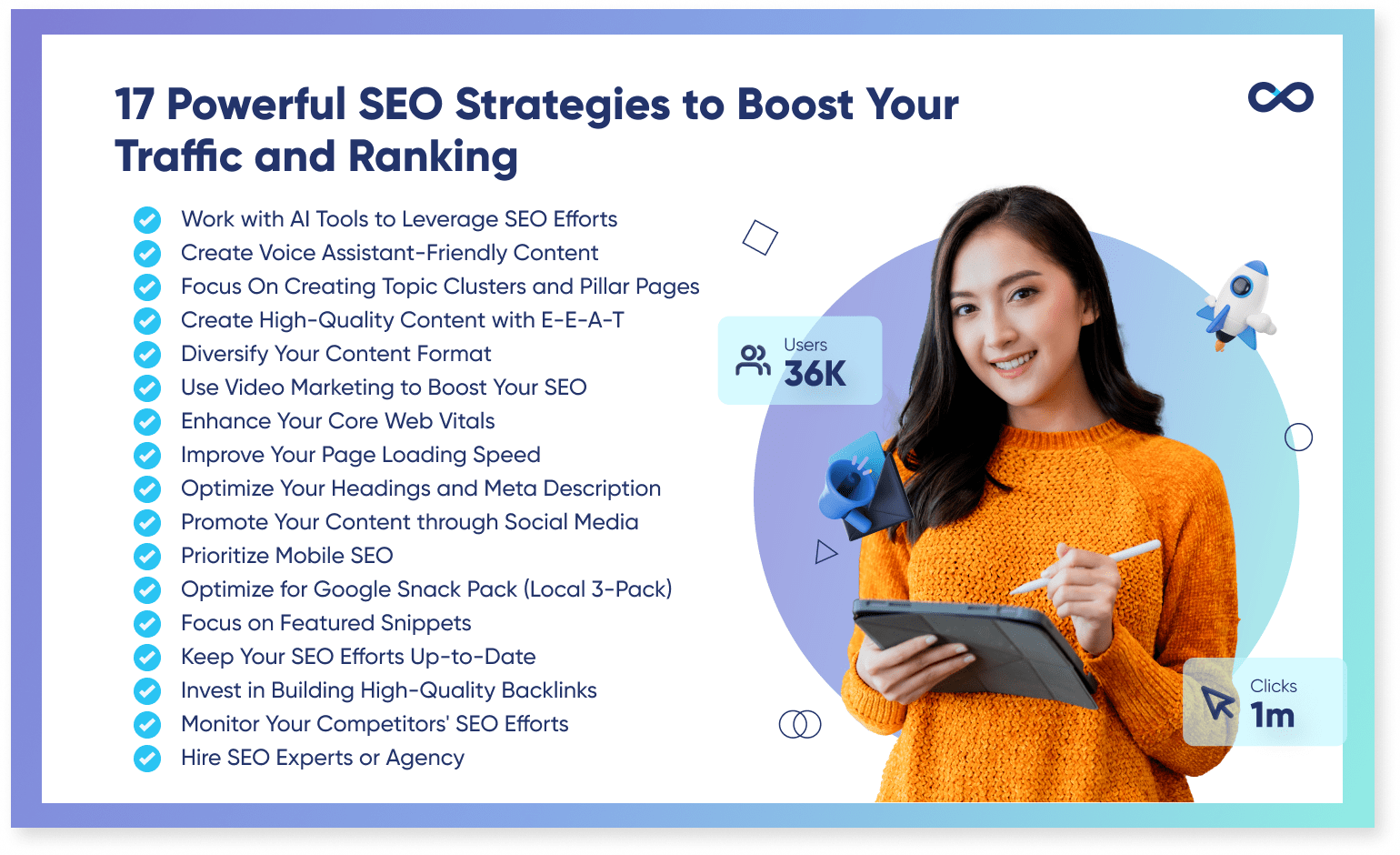
Page Speed: Seamless User Experience
Page speed directly impacts user experience and SEO rankings.
Slow-loading websites frustrate users and lead to higher bounce rates.
To improve page speed, you need to:
- Optimise image sizes
- Leverage browser caching techniques
- Minimise server response time
- Use Content Delivery Networks (CDNs).
Backlinks: Strategic Backlinks for SEO
Backlinks are links from other websites pointing back to your site.
They are among the most critical factors in determining authority and trustworthiness in Google’s eyes.
There are many ways to build backlinks, but here are a few for your reference:
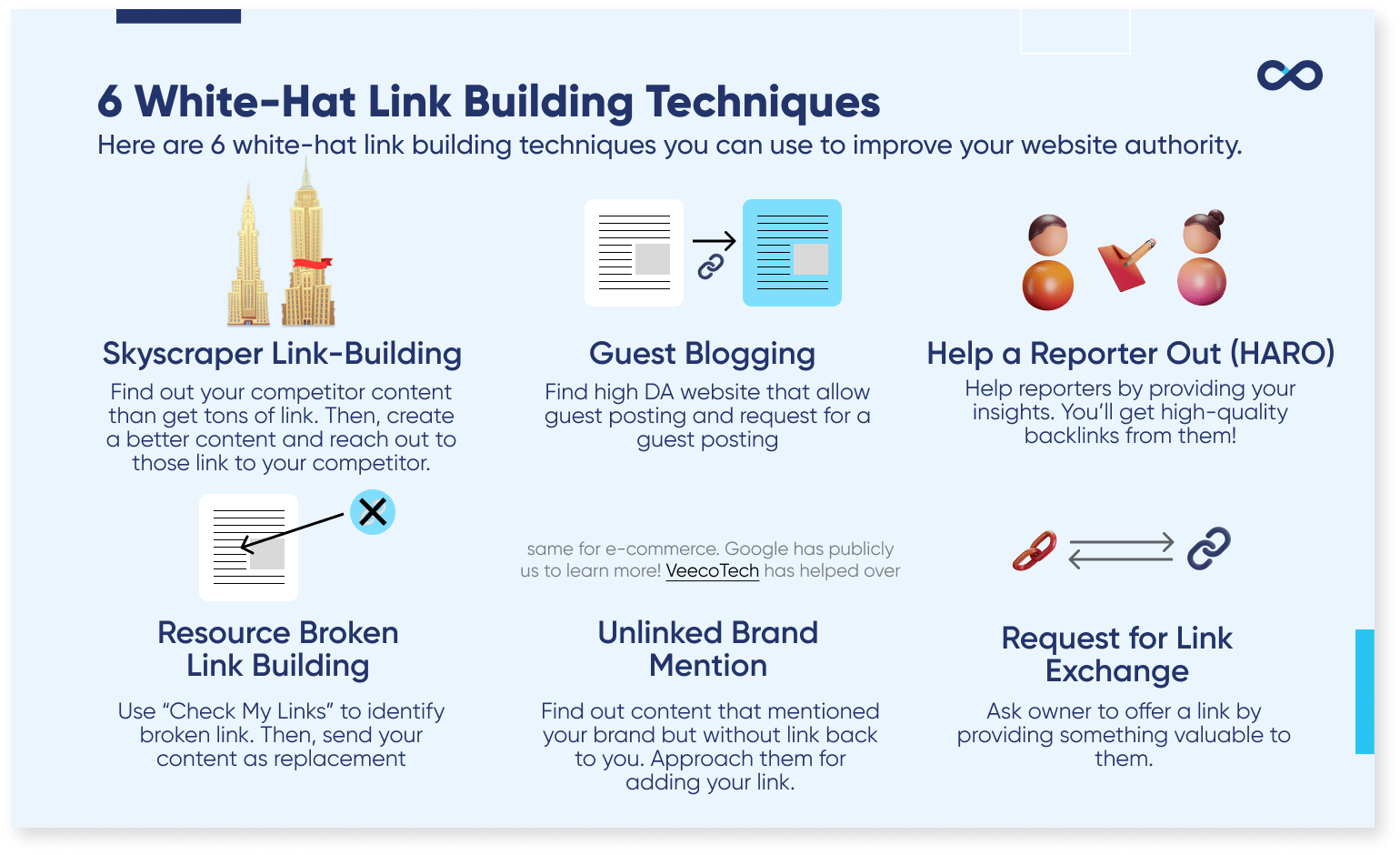
When you build backlinks, it’s essential to focus on the quality and quantity of backlinks.
Now, when I say quantity, I don’t mean you should simply get a gig from Fiverr that promises 9,900 backlinks😅
The quantity is consistent in acquiring new backlinks. Many people think it’s enough to build 2-3 quality links, but consistency is crucial for building your site authority.
Another thing to note is that while earning backlinks from reputable and relevant websites in your industry can enhance your SEO ranking, other no-follow links, such as social media, relevant forums, and directories, are also crucial.
Remember that SEO is an ongoing process that takes time to see results.
It’s important to consistently check how well your website is performing and make any necessary changes based on the data you analyse. This will help you maintain a strong position in search engine rankings.
Monitoring and Adaptation: Staying Ahead of the Game
SEO ranking is not a one-time effort but an ongoing process that requires continuous monitoring and adaptation.
Search engine algorithms frequently change, and new competitors may emerge in your industry. It’s essential to stay updated with the latest SEO trends and adjust your strategies accordingly.
How to Improve Your SEO Ranking?
Now, here comes the exciting part. If SEO still feels a bit confusing, don’t worry! Take a moment to dive into our ultimate SEO guide for beginners.
Ready? Let’s explore the steps to boost your website’s ranking.
The Core of SEO: Keyword Research & Content Writing
Keyword research and content writing play a crucial role in improving SEO rankings.
You can optimise their content by identifying relevant keywords with high search volume and low competition to attract targeted organic traffic.
Proper keyword utilisation is key to boosting visibility in search results.
This involves strategically incorporating keywords throughout the content, including meta tags, headings, and alt text for images.
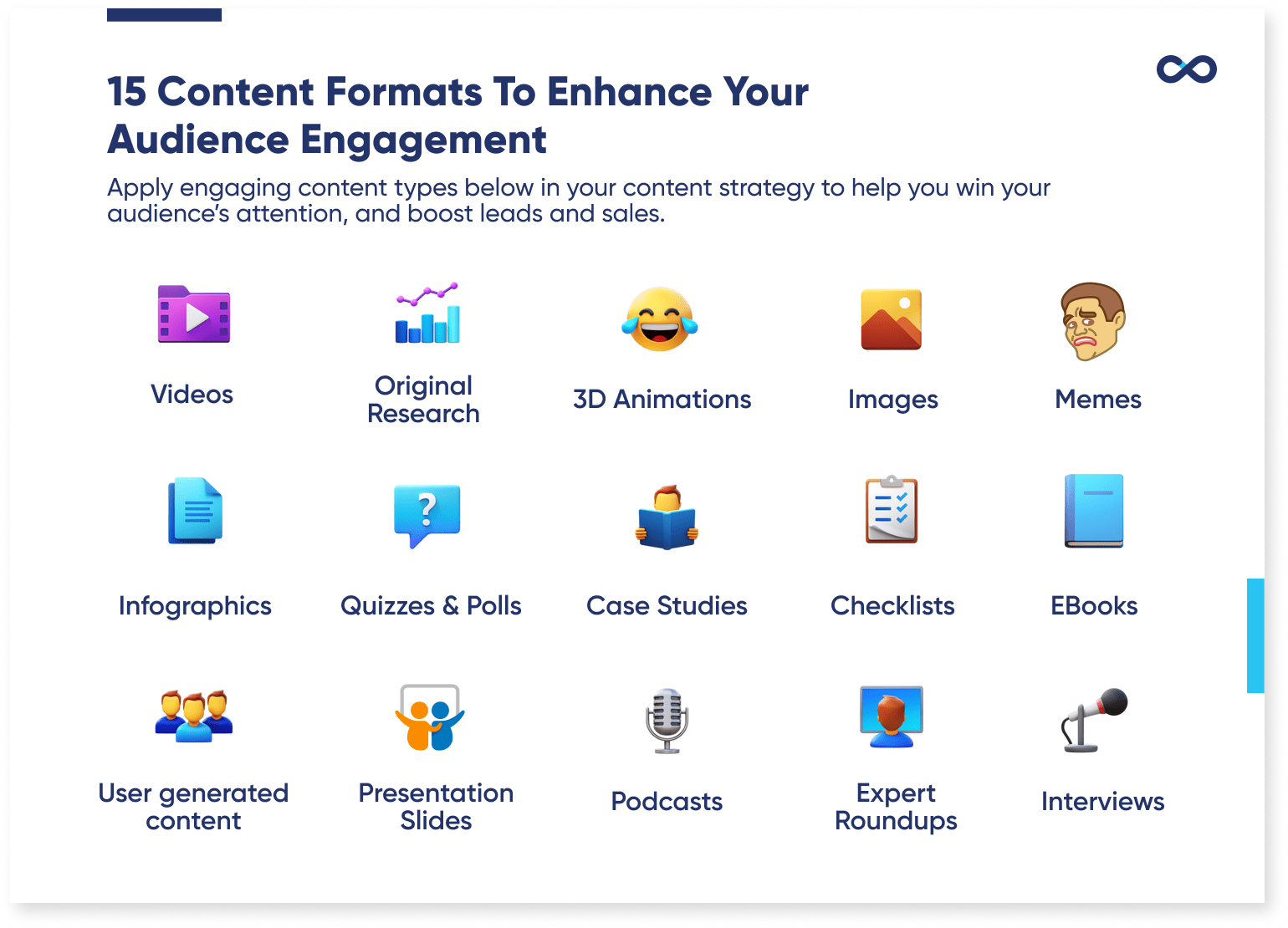
Quality Content Creation
Quality content is king.
Don’t believe it?
Here’s a proof from our site! 😀
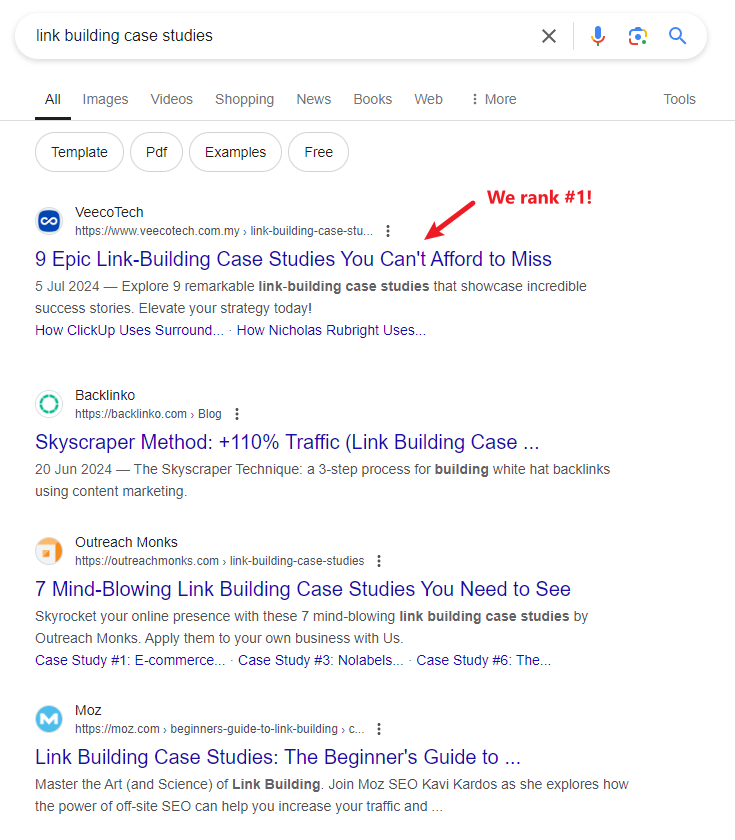
Well-written and informative articles engage readers and signal credibility to search engines.
And the best way to show your expertise is to add originality to your content. You can always go through the top 10-20 SERP results and see what’s lacking from the top results.

Besides, regularly updating website content is another important aspect of maintaining good SEO rankings. For example, remove poor-quality content, update statistics, or fix broken links.
Search engines favour fresh and up-to-date information, indicating that the website is active and relevant.
Another issue is about word count. While there isn’t an exact word count requirement for every piece of content, longer articles tend to perform better in SEO.
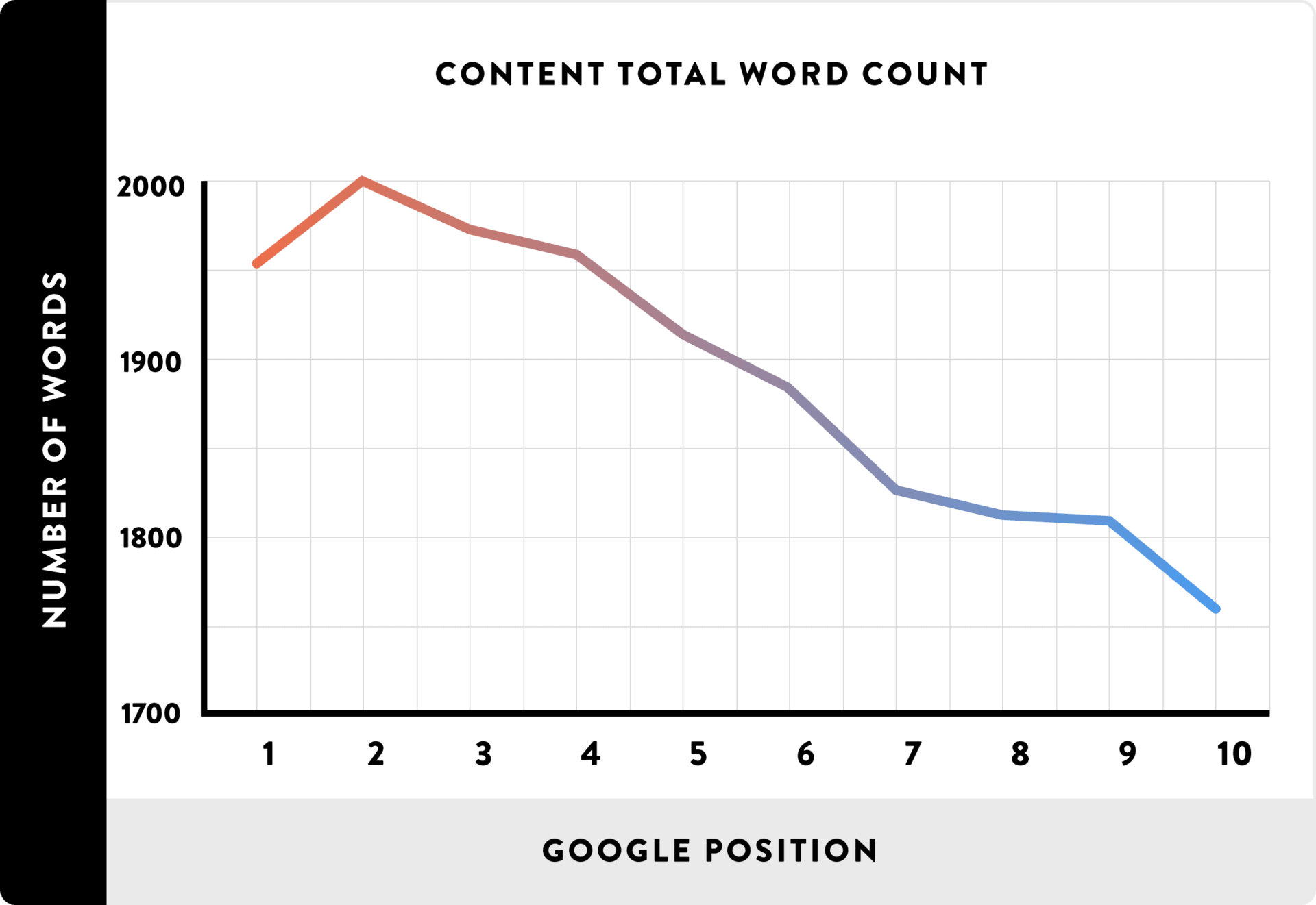
This is because longer articles have more opportunities to incorporate relevant keywords naturally and provide comprehensive information on a topic.
In addition to word count, other factors contribute to the overall quality of the content.
These include proper formatting with headings and subheadings, using bullet points or numbered lists when appropriate, adding relevant images or videos, and ensuring grammatical accuracy.
It’s important to remember that SEO takes time and effort; it’s not an overnight process. Consistency and continuous improvement are key to achieving and maintaining good SEO rankings.
Technical SEO Enhancements
Technical SEO refers to optimising your website’s technical aspects to improve its search engine rankings.
It involves changing your website’s structure, coding, and performance.
Title & Meta-tag Optimisation
Title and meta-tag optimisation is like giving your page a name so that search engines can understand what it’s all about.
And when search engines understand what your page is about, they can rank it higher in their search results.
If you want your website to be seen by more people, you must ensure your title tags are optimised!
Further reading: Formula for writing great titles and meta descriptions
Tracking and Analysing SEO Performance
Tracking and analysing the performance of your SEO efforts is crucial to ensure that your website ranks well in search engine results.
It helps you gain valuable insights into your website’s performance and make informed decisions to improve its visibility.
Tools for Tracking Rankings
To track keyword rankings effectively, various tools are available to help you monitor your website’s performance.
One such tool is Google Search Console, a free service provided by Google that offers valuable insights into your organic search traffic.
With Google Search Console, you can see which keywords drive traffic to your site and identify areas where improvements can be made.
However, there are a few things that could be improved with this tool, such as tracking the exact ranking of the keywords that you want to look for. You also need help seeing what are the changes in the ranking.
If you consider free, very basic tracking, this keyword rank tracker is recommended.
For comprehensive data on keyword positions, search volume, and competition analysis, try SEMRush or Ubersuggest.
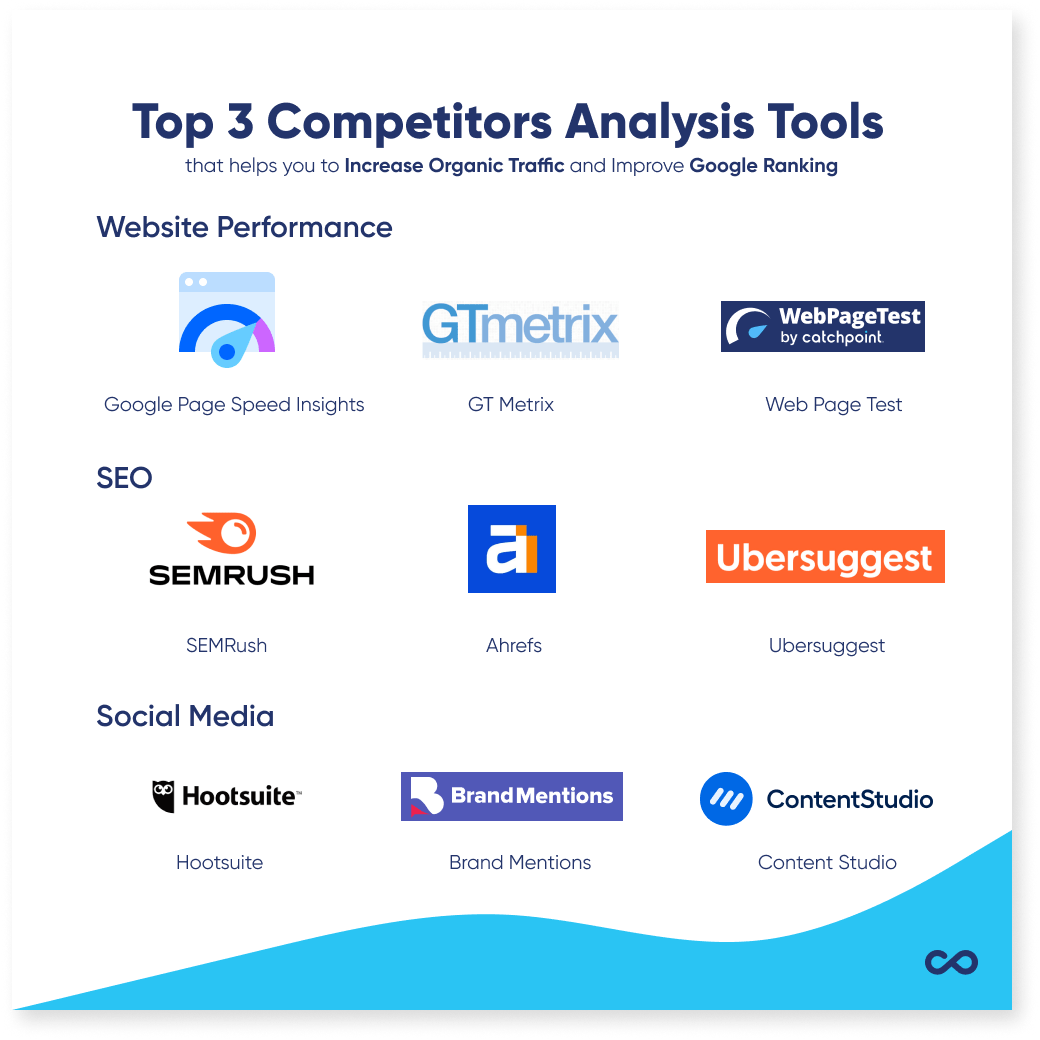
Regularly tracking keyword rankings allows you to identify areas of improvement in your SEO strategies.
If certain keywords are not performing well or have dropped significantly in rankings, it may indicate the need for adjustments in your content or optimisation techniques.
On the other hand, if specific keywords consistently improve rankings over time, it provides validation that your efforts are paying off.
Site Traffic Insights
Analysing website traffic data provides valuable insights into user behaviour and preferences.
One way to gain these insights is by monitoring popular pages on your website.
Identifying which pages receive the most traffic helps determine what content resonates with users and enables you to create more engaging material.
For instance, we observed a significant increase in organic traffic to our client’s website after publishing a blog post that ranked in the top 3.
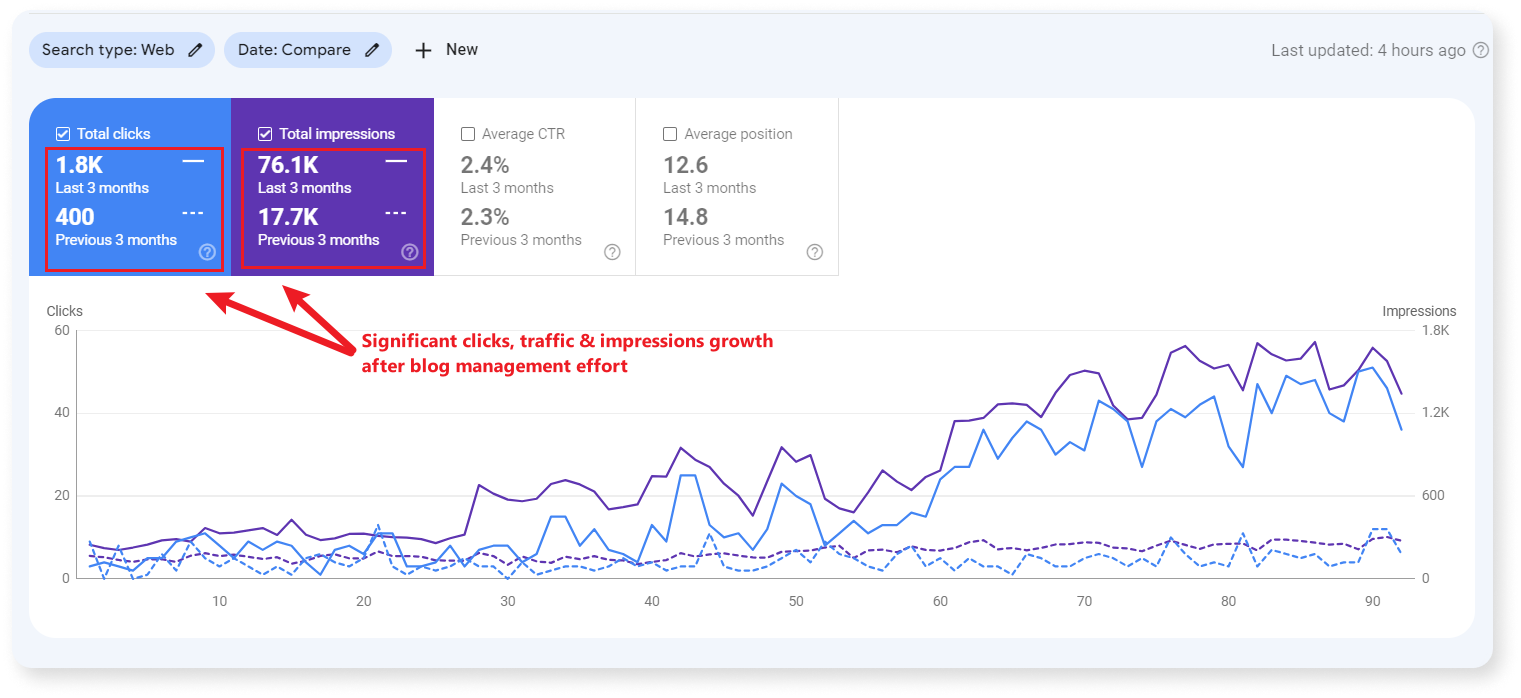
The positive impact on traffic indicates that the content resonates well with users, prompting us to update and maintain its relevance consistently.
Furthermore, analysing sources of traffic allows you to understand how users are finding your website.
Are they coming from search engines, social media platforms, or referral sites?
This definitely helps you to allocate resources to the most effective channels and refine your marketing strategies accordingly.
Monitoring traffic patterns over time also plays a crucial role in measuring the effectiveness of your SEO strategies.
If you notice a consistent increase in traffic after implementing specific SEO techniques, it demonstrates the success of those strategies.
Conclusion
So there you have it – the ins and outs of SEO ranking.
Now that you have a solid grasp of these concepts, it’s time to take action.
Not feeling confident enough to tackle SEO on your own? You’re not alone 😊
Our SEO service has helped clients see significant organic traffic increases within just 3 months.
Frequently Asked Questions
What is SEO ranking?
SEO ranking refers to a website’s position in SERPs for specific keywords. It determines the visibility and organic traffic a site receives. Higher rankings mean increased chances of attracting visitors and potential customers.
How does content writing impact SEO ranking?
Content writing plays a crucial role in SEO rankings. High-quality, relevant, and engaging content helps search engines understand your website’s purpose and relevance to users’ queries. Well-optimized content with targeted keywords can improve your site’s visibility and increase its chances of ranking higher in search results.
What are Google’s top ranking factors?
Google considers numerous factors when determining rankings, including relevance, user experience, backlinks, page speed, mobile-friendliness, and more. Relevance involves aligning your content with search intent. User experience focuses on providing a seamless browsing experience. Backlinks indicate credibility and authority. Optimising these aspects can positively impact your SEO rankings.
How can I track and analyse my SEO performance?
Tracking and analysing your SEO performance is essential for understanding what works and what needs improvement. Utilise tools like Google Analytics to monitor organic traffic, keyword rankings, bounce rates, conversion rates, and other relevant metrics. Analysing this data allows you to make informed decisions to optimise your site further.
Why are technical SEO enhancements important for rankings?
Technical SEO enhancements ensure that search engines can easily crawl and index your website’s pages. Factors like proper URL structure, optimised metadata, XML sitemaps, and schema markup implementation help search engines understand your content better. By enhancing the technical aspects of your site, you improve its chances of achieving higher rankings.






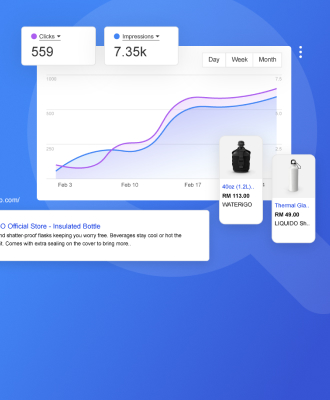




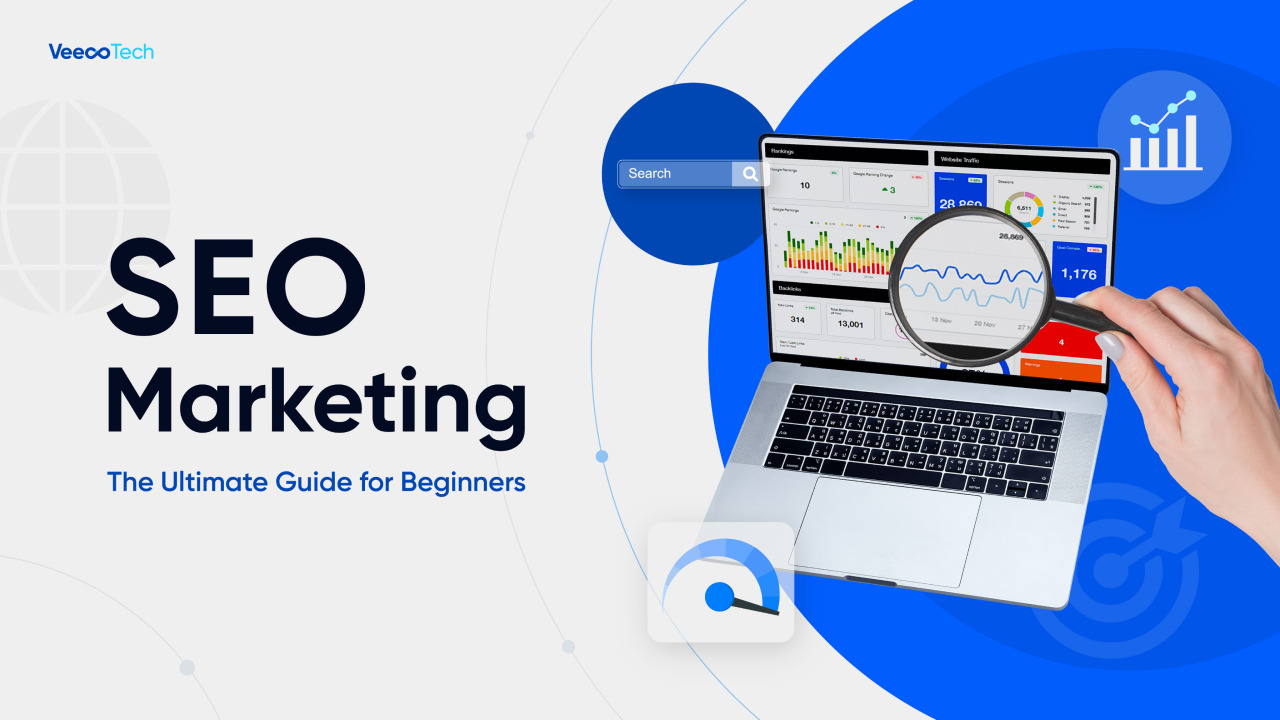

Leave A Comment